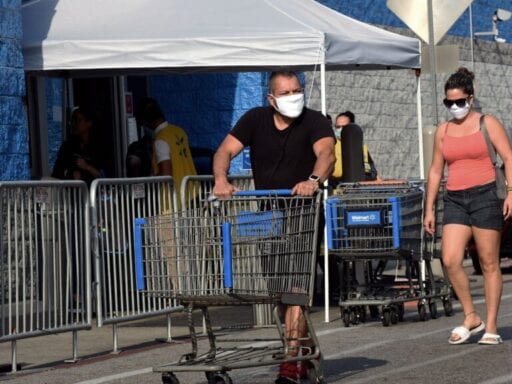A new poll shows why Trump is not in charge of when people — and the economy — will go back to normal.
President Donald Trump has made it clear recently he is eager to end social distancing policies and get the country’s economic engine firing again, but a Gallup poll released Tuesday shows that Americans may be reluctant to do so.
According to the polling data, just 20 percent of Americans would immediately return to normal activity once state restrictions are lifted, while 71 percent would wait to see whether the change in guidelines led to increased confirmed Covid-19 cases before deciding what to do. And 10 percent would continue limiting social contact regardless of developments.
The survey of 3,881 US adults (which has a 3 percentage point margin of error) seems to suggests a disconnect between the Trump administration’s desire to reopen the economy and an American public that wishes to avoid dying from an easily communicable infectious disease.
In Monday’s daily coronavirus press conference, Trump said he believes “everybody wants to open” the country back up and that “our people want to get back to work, and I think there’s a pent-up demand like there hasn’t been in a long time.” To this end, he recently announced a new committee tasked with planning and executing the end of social distancing in the country.
And he has tweeted that the cure for coronavirus (social distancing and shutting down the economy) could be worse than the disease, recognizing that people need money under capitalism to provide for their basic livelihoods.
But Gallup’s work suggests a concern over the virus that transcends economic concerns. It found that 81 percent of those not currently working would not rush back to normal life should the country be reopened, with 71 percent saying they’d take a wait-and-see approach and 10 percent saying they’d indefinitely limit contact with others.
This is a striking result considering the pandemic has strained the socioeconomic system in unparalleled ways over the first three months of 2020. Over the past three weeks, there have been 16.8 million new initial claims for unemployment as restaurants, retailers, and other nonessential businesses have been shuttered to limit the spread of the virus.
When and how to reopen the economy has become a political issue
Previously, Trump toyed with the idea of easing social distancing guidelines before Easter, and it remains clear he wants to get the economy going again as soon as possible.
Nevertheless, senior administration officials responsible for managing public health, like director of the National Institute of Allergy and Infectious Diseases Dr. Anthony Fauci, have remained steadfast in their belief that the country should remain closed for the foreseeable future, with some lighter-hit geographic areas possibly opening in about a month.
It is not going to be a light switch that we say, OK, it is now June, July or whatever, click, the light switch goes back on,” Fauci told CNN. “It’s going to be depending where you are in the country, the nature of the outbreak that you already experienced, and the threat of an outbreak that you may not have experienced.”
It appears the majority of the American public hews closer to the Fauci approach for coming out of pandemic lockdown. Gallup found that people in rural areas were more likely than their suburban and city-dwelling counterparts to want to immediately return to normal activity, and urban areas like New York City have been among the hardest hit, while more rural places, like Wyoming (which recorded its first confirmed Covid-19 related death on Monday) have seen fewer confirmed cases.
The Gallup polling data also shows an ideological split. Party affiliation was the clearest indicator of who might immediately return to normal after social distancing ends. Almost a third (31 percent) of Republicans told Gallup they would immediately return to normal activity, while just 19 percent of independents and 11 percent of Democrats said they would do the same.
Ultimately, it’s not Trump but individual state governors who will make the decision that they feel is best for their states. To that end, several regional groups of states have begun coordinating to plan for an end to social distancing orders.
So far, the West Coast states, California, Oregon, and Washington have joined in coordination, as have a consortium of mid-Atlantic and New England states. Regardless of government actions, however, it’s going to be the American people who will decide when, on an individual level, things go back to normal. And while this is just one poll, these results suggest they may be cautious about doing so.
Support Vox’s explanatory journalism
Every day at Vox, we aim to answer your most important questions and provide you, and our audience around the world, with information that has the power to save lives. Our mission has never been more vital than it is in this moment: to empower you through understanding. Vox’s work is reaching more people than ever, but our distinctive brand of explanatory journalism takes resources — particularly during a pandemic and an economic downturn. Your financial contribution will not constitute a donation, but it will enable our staff to continue to offer free articles, videos, and podcasts at the quality and volume that this moment requires. Please consider making a contribution to Vox today.
Author: Katelyn Burns
Read More



